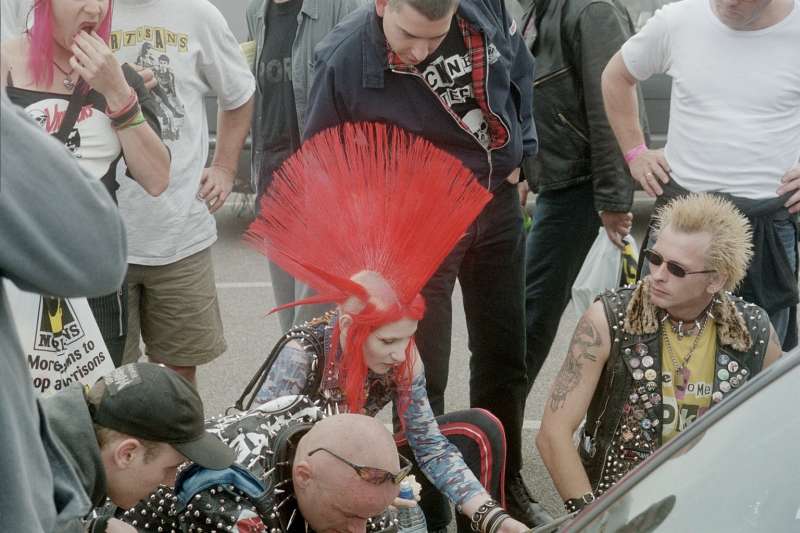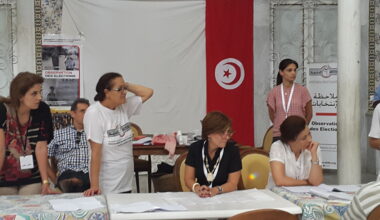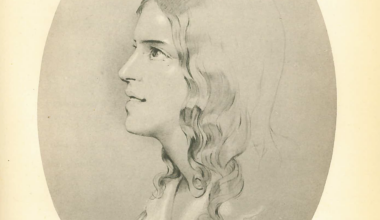As both a participant and observer, I’ve seen the underground punk scene increasingly succumb to identity politics and cancel culture at the expense of free thought and expression. But when you find yourself the target of a call-out or cancellation, the issue swiftly turns personal.
One evening, I received a disconcerting call from a longtime bandmate in the UK, a very close friend for years. It turned out another bandmate, with whom I’d had only minimal contact outside of gigs, had accused me of ‘Islamophobia’ and ‘transphobia’ for my online criticisms of Islam and transgender ideology. Apparently, people in his radical-left circle had alerted him to what they deemed my ‘bigotry.’
My friend and I talked for hours. I explained my perspective but ultimately agreed to step down as guitarist to mitigate the fallout. A couple of days later, another close friend in the group informed me that our scheduled concerts would go ahead without me. We agreed that the band would make no official statement. And I wouldn’t apologise, as I had done nothing wrong—merely expressed my views publicly on social media and in magazine articles.
Punk culture traditionally leans left, attracting young people high in personality traits associated with leftism, such as compassion, intellectual curiosity, and openness to experience. In recent years, however, a Manichaean ideology with Maoist undertones and an obsession with race and gender identity has taken hold of the scene, replacing punk’s humanist outlook with an illiberal mindset. Ideological enforcers determined to purge dissenters now wield disproportionate power, stifling free and open debate. Although their admittedly well-intentioned activism is often framed as promoting kindness, solidarity, or social justice, it masks an authoritarian drive for ideological purity, a hallmark of radical political movements throughout history.
What shocks me most is how cancel culture has become fully normalised in punk communities that supposedly champion nonconformity, anti-authoritarianism, and freedom of expression. Rather than reacting with outrage and defiance, people now accept it as if it were a law of nature. The punk ethos of questioning preconceived notions has all but vanished. Ironically, punk counterculture today aligns with the prevailing views on issues like race and gender upheld by cultural and corporate elites. While this alignment doesn’t necessarily discredit those views, it is telling that I’m ostracised for challenging them. Punk has been ideologically captured.
Petty individuals once derisively referred to as the ‘scene police’ for trying to control what others said, did, or wore have long been a part of punk culture. In the 1990s and 2000s, their presence would spark lively debates about political correctness, religion, and more. Today, however, open discussion is discouraged, and fear of voicing dissent—or even associating with those who do—has become pervasive.
Aside from retweeting J.K. Rowling—whose gender-critical views have made the Harry Potter author a pariah among progressives—I haven’t been told exactly which of my views are so beyond the pale as to warrant my expulsion.
I don’t blame my bandmates for wanting to avoid the crossfire. I chose to speak my mind, fully aware that my views might be perceived as offensive and that it was only a matter of time before someone took issue. Moreover, while I admire punk’s do-it-yourself ethos and underground network, I’ve increasingly felt out of place performing at far-left music venues as I’ve come to reject their ideology. Still, a bitter taste lingers. My friends know I’m not a bigot. Would my stepping down be seen as an admission of guilt? Guilty of what, exactly?
Aside from retweeting J.K. Rowling—whose gender-critical views have made the Harry Potter author a pariah among progressives—I haven’t been told exactly which of my views are so beyond the pale as to warrant my expulsion. In my articles and social media posts, I’ve only ever targeted ideas and behaviours, not people—a distinction lost on those who equate disagreement with ‘hate speech’ and words with violence. I’ve critically examined Islam as a belief system with undesirable consequences for both Muslims and non-Muslims and drawn logical conclusions about the challenges posed by mass Muslim immigration to the West. And while I harbour no ill will toward trans-identified individuals, I’ve taken issue with aspects of transgender ideology.
Why tackle such contentious subjects in the first place, knowing it would stir controversy? Because, as someone who values Enlightenment principles such as reason, secularism, and open enquiry, I reject dogmatic belief systems that gaslight, morally coerce, or emotionally blackmail people into conforming to ideological fictions. It’s a matter of principle.
As a society, we now adhere to Islamic blasphemy laws under threat of violence, reframing our submission as tolerance. We willfully overlook rampant misogyny, homophobia, and anti-Semitism within Muslim communities out of fear of being labelled ‘Islamophobic.’ As the famous quote goes, ‘Islamophobia is a word created by fascists, and used by cowards, to manipulate morons.’ We can resist such manipulation while also condemning anti-Muslim hate crimes. However, by viewing the world through a binary lens of oppressor and oppressed—with Muslims cast as the latter—contemporary progressives, both within and outside of punk, often refuse to engage with such nuance. Narrative is king.
Few contemporary ideologies demand as much suspension of disbelief as transgenderism. Non-compliance is met with accusations of wanting to erase the ‘lived experience’ of trans people and—analogous to criticism of Islam—is frequently pathologised as ‘transphobia.’ Since when, however, does a person’s self-perception impose moral obligations on others? And why should it, for instance, take precedence over women’s and girls’ sex-based rights, such as their rights to single-sex spaces and services? These are fair yet taboo questions. Asking them, as I have, challenges the ideological consensus within progressive punk communities.
While I fully acknowledge the psychological reality of gender dysphoria and support trans people’s right to live authentically and be respected, I adhere to Soviet dissident Aleksandr Solzhenitsyn’s principle to ‘live not by lies.’ And although I don’t consider myself a follower of Jordan Peterson, I agree with him when he says, ‘When you have something to say, silence is a lie.’ In keeping with this philosophy, I reserve the right to dispute gender identity pseudoscience, particularly in contexts where biological sex matters. This commitment to following the facts wherever they lead and voicing my reasoned conclusions has put me at odds with the ideological gatekeepers in the punk scene.
In addition to challenging the manipulative myth of a ‘transgender genocide’, I consider it morally imperative to condemn unethical practices in youth gender medicine, often euphemistically referred to as ‘gender-affirming care.’ After all, there is no reliable evidence that transitioning reduces suicide rates or improves mental health in troubled kids, which is unsurprising given that gender dysphoria is associated with a range of psychiatric comorbidities. Furthermore, most young people eventually outgrow their gender dysphoria.
The trouble is that when ideology merges with identity, disagreement can register as a personal attack, and contradictions within the philosophy may go unnoticed.
When did we start trusting children to determine what’s best for them and accepting their self-image without question? When did they acquire the maturity to consent to medical interventions that will irreversibly impact their sexual and reproductive development? Why should it be taboo to connect the sharp rise in youth trans-identification, particularly among adolescent girls, to social contagion? Increased social acceptance alone cannot account for a surge this dramatic—not even within the queer-positive punk scene.
A disproportionally large number of punks present as trans or queer today, which, on the surface, aligns with punk’s historical rejection of heteronormativity. In the 1970s and 1980s, the scene embraced androgyny, blurring traditional gender lines. Since the 1990s, openly gay bands like Pansy Division and Limp Wrist have gained popularity. It also makes sense that avant-garde ideologies, such as intersectional feminism, would resonate with rebellious punks. The trouble is that when ideology merges with identity, disagreement can register as a personal attack, and contradictions within the philosophy may go unnoticed.
For example, gender-nonconforming children, labelled as ‘trans’, are often portrayed as being ‘trapped’ in the wrong sex and in need of ‘fixing.’ Yet research indicates they are likely to grow up to be gay. By largely endorsing this ideological narrative, punks have contributed to the indoctrination of vulnerable youth into a sexist, anti-gay cult under the guise of compassionate progressivism. After years of demonising gender-critical voices, they now feel compelled to double down on their stance and ‘excommunicate’ anyone who dares to challenge it. In other words, while the punk scene has historically rejected sex stereotypes and gender norms, it now reinforces them through a pseudo-progressive belief system.
What began as an emancipatory ethos uniting participants from all backgrounds under a shared punk identity has, over the years, morphed into race- and gender-obsessed identity politics. ‘Question everything’ has devolved into ‘stay in your lane.’ This mindset is rooted in standpoint theory, which views knowledge as a function of social position. According to this theory, only a transgender person, for example, can legitimately speak on transgender issues. However, once subjective bias is elevated to the level of evidence, truth becomes relative, and rational objections are easily dismissed as bigotry, especially when they come from someone deemed part of the ‘oppressor’ group. This inherently unstable epistemology requires constant protection from dissent—and I have been identified as a threat.
There has also been a shift in the punk scene from classical egalitarianism to equalitarianism. Rather than treating people equally regardless of race or gender, participants increasingly interpret disparities in group outcomes and representation as proof of structural discrimination. This perspective implies that differences between groups are solely due to varying levels of oppression. As a result, perceived deficits are typically addressed through positive discrimination. For instance, some punk promoters now exclusively book bands featuring non-white or non-‘cishet’-male members.
There are, of course, many possible reasons why women and minorities might be underrepresented in punk music. I share the view of American punk icon Ian MacKaye, best known for his bands Minor Threat and Fugazi, who contends that actively trying to get these groups involved ‘seems disrespectful’ as they are ‘certainly capable of making up their own minds’ about whether they want to participate. For him, it’s not an issue of access, but a matter of taste, given that punk has no inherent barriers. However, this viewpoint is no longer considered acceptable among progressive punks.
Efforts have instead been made to spotlight black and other minority musicians, for example. While it’s true that influential figures, such as Washington, DC’s Bad Brains, have included people of colour, the impulse to rewrite punk history to fit ideological preferences reveals a sense of ‘white guilt.’ However, the reality remains that punk is historically a white subculture—just as hip hop is historically a black subculture. Acknowledging this doesn’t preclude welcoming minority participation, but the prevailing hypersensitivity around race and ethnicity has never sat well with me.
As a visible minority, Muslims are now often treated as a protected group, blurring the distinction between unjust discrimination and legitimate criticism of Islam. While punk has traditionally rejected organised religion, it now provides ideological cover for religious fundamentalists. The punk slogan ‘Smash the patriarchy!’ seems to exclude Islamic practices like female veiling, a clear symbol of patriarchal oppression and gender apartheid. Critics of such practices are routinely branded as ‘Islamophobic.’ As Christopher Hitchens warned back in 2009, ‘The term is already being introduced into the culture as if it was an accusation of race hatred, for example, or bigotry, whereas it’s only the objection to the preachings of a very extreme and absolutist religion.’ Fifteen years later, I felt the ramifications of this development firsthand—in the punk scene, of all places.
I have yet to hear a single rational argument from my censorious detractors against any of my positions. Instead, they rely on thought-terminating clichés like ‘transphobia’ and ‘Islamophobia.’
‘Punk rock, at its best,’ writes Greg Graffin, lead singer of Bad Religion and an evolutionary biologist, ‘embraces an openness to experience, a reliance on reason and evidence, and a questioning of received wisdom.’ Or, as the Dead Kennedys sang in 1979, ‘Punk ain’t no religious cult. Punk means thinking for yourself.’ Embracing this spirit, I have faced defamation and ostracisation.
Needless to say, I have yet to hear a single rational argument from my censorious detractors against any of my positions. Instead, they rely on thought-terminating clichés like ‘transphobia’ and ‘Islamophobia.’ By stifling free speech and open debate, they deny themselves and others the opportunity to discover if their views are genuinely, rather than merely politically, correct. Whether in the punk scene or in society at large, those of us who value truth—defined by its alignment with evidence and reason—must stand our ground and brave the consequences.
Related reading
Cancel culture and religious intolerance: ‘Falsely Accused of Islamophobia’, by Steven Greer, by Daniel James Sharp
British Islam and the crisis of ‘wokeism’ in universities: interview with Steven Greer, by Emma Park
‘F*** it, think freely!’ Interview with Brian Cox, by Daniel James Sharp
The Marketplace of Ideas will always exist. The only choice we have is how to work with it. By Helen Pluckrose
‘Nature is super enough, thank you very much!’: interview with Frank Turner, by Daniel James Sharp
Young, radical and morally confused, by Gerfried Ambrosch
South Asia’s silenced feminists, by Kunwar Khuldune Shahid
‘When the chips are down, the philosophers turn out to have been bluffing’, interview with Alex Byrne by Emma Park
Blasphemy and bishops: how secularists are navigating the culture wars, by Emma Park
The falsehood at the heart of the trans movement, by Eliza Mondegreen
Secularism and the struggle for free speech, by Stephen Evans
On sex, gender and their consequences: interview with Louise Antony, by Emma Park
Defending liberalism: interview with Helen Pluckrose, by Daniel James Sharp
80 years on from Schrödinger’s ‘What Is Life?’, philosophy of biology needs rescuing from radicals, by Samuel McKee
Britain’s liberal imam: Interview with Taj Hargey, by Emma Park
‘A godless neo-religion’ – interview with Helen Joyce on the trans debate, by Emma Park
Britain’s blasphemy heritage, by David Nash
The need to rekindle irreverence for Islam in Muslim thought, by Kunwar Khuldune Shahid
Free speech at universities: where do we go from here? by Julius Weinberg









4 comments
I am horrified that punk rock in the 2020s reflects the academic and social mainstream where one comment draws criticisms that can result in someone leaving a band. In my day in the 1980s we got drunk, listened to a vast array of bands, occasionally cut ourselves up with broken beer bottles (self inflicted) for a bit of flair, and slammed danced on and off for hours (without fighting one another). Sounds like the current punk scene has fallen victim to woke ideologies. Sigh.
https://youtu.be/jYKAQZUAbHU?si=LpaE94aOYjq6FWxg
Any questions, you disengenuous artiviste?
The punk scene has always been “woke.”
Being AWAKE to the problems of this world and the cage we’re trapped in, in a capitalist society is literally what punk is about.
If you attempt to bring bigotry such as transphobia into a punk scene and then use a dead Kennedy’s lyric as a defence point then I think you’re just moronic. Jello was critical of bigots his entire career. Punk has always been anti-racism, anti-fascist, with the underlying goal of people being themselves. A trans person or a brown person for example don’t choose to be those things. Those hateful of them choose to be bigots.
And yes associating yourself with bigots such as JK Rowling is complicity to their bigotry and anti punk idgaf what you say in your little blog.
Conservative punks don’t exist, they’re all masquerading posers.
Your email address will not be published. Comments are subject to our Community Guidelines. Required fields are marked *
Donate